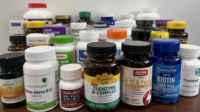
Answer:
There are important differences between folic acid and folate.
Folic acid is a synthetic form of the B vitamin folate (B9) which naturally occurs in foods, such as dark, green leafy vegetables and oranges. Folic acid has the same nutritional benefits as folate, but folic acid is absorbed much better (about 70% better) than natural folate. For this reason, folic acid is commonly used in dietary supplements and to fortify foods.
To help consumers understand this difference, since 2021, labels show “dietary folate equivalents” or “DFE” to describe the amount of folate-related compounds in a product. The adult daily requirement is 400 mcg of natural folate, or 400 mcg DFE, but you only need 235 mcg of folic acid (or methylfolate – another synthetic form of folate) to achieve this, so, 235 mcg of folic acid will also be labeled as 400 mcg DFE.
Although better absorbed, there is a downside to folic acid (as well as methylfolate) – too much can be harmful, causing kidney damage and other potential adverse effects if taken at a high dose for long periods of time. In contrast, there is no established limit on how much natural folate you can consume from foods. The Tolerable Upper Intake Level (or UL) for folic acid (and methylfolate) is 1,000 mcg per day for individuals 19 and older (see limits and requirements by age and gender). Bear in mind that this is based on micrograms of actual compound and not DFE. A product that contains 1,360 mcg DFE of folic acid does not exceed the adult UL because it contains only about 800 mcg folic acid.
More information about folate, folic acid, and methylfolate (L-5-methyltetrahydrofolate) is found in ConsumerLab.com’s B Vitamins Review, which includes tests and reviews of popular folate and folic acid supplements, as well as B complexes, including our Top Picks among them. Also see our Multivitamin Review, as many of the tested products include folate, particularly prenatal vitamins – in which folate (usually as folic acid) is an important ingredient.
Join today to unlock all member benefits including full access to all CL Answers and over 1,400 reviews.
Join NowAlready a member? Sign In Here.
Join now at www.consumerlab.com/join/











Submit your comment
This feature is restricted to active members.
Join now to add comments and get all member benefits, including over 1,400 reviews.
Join NowAlready a member? Sign in here.